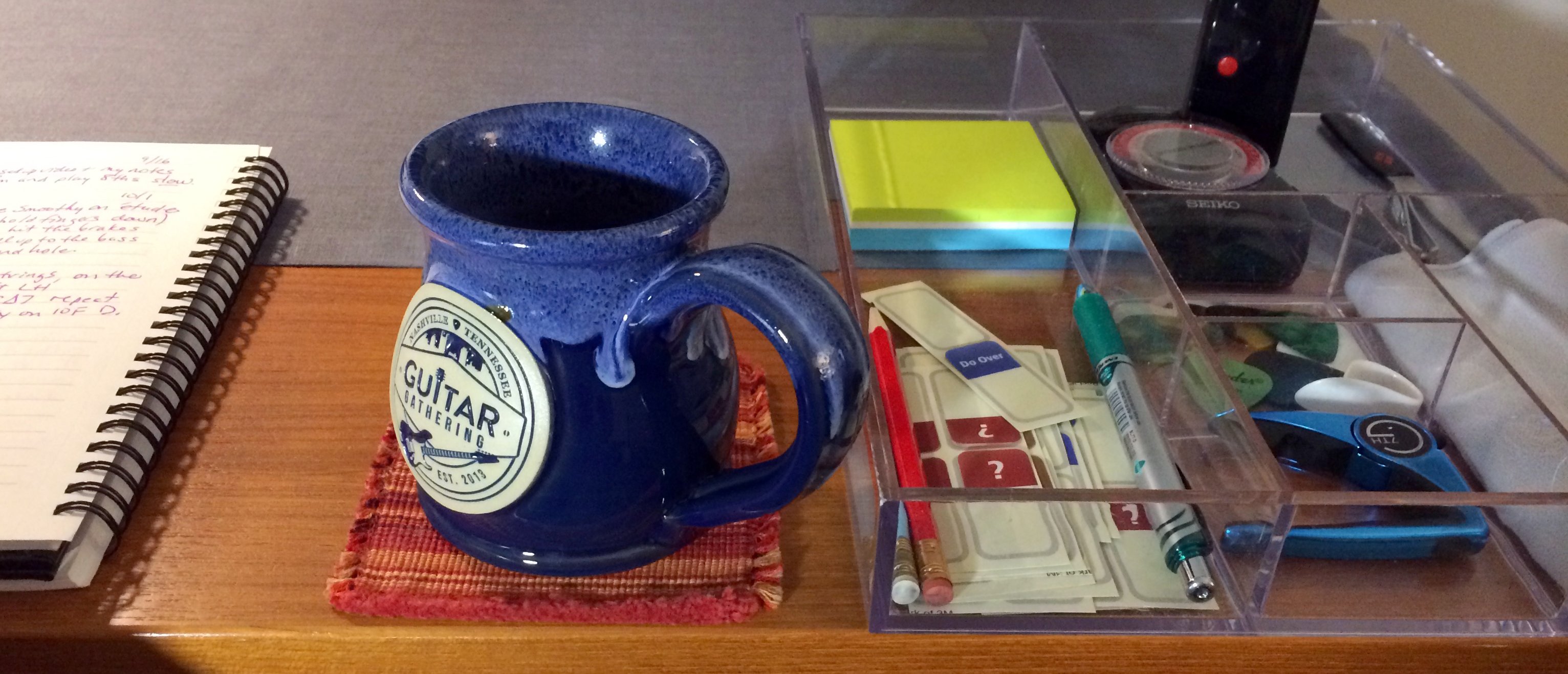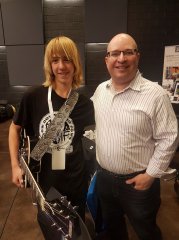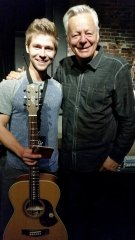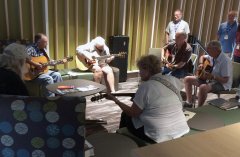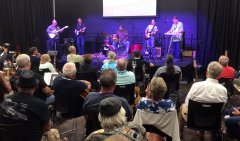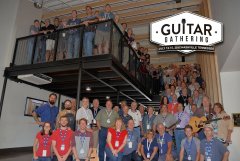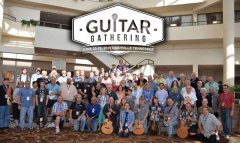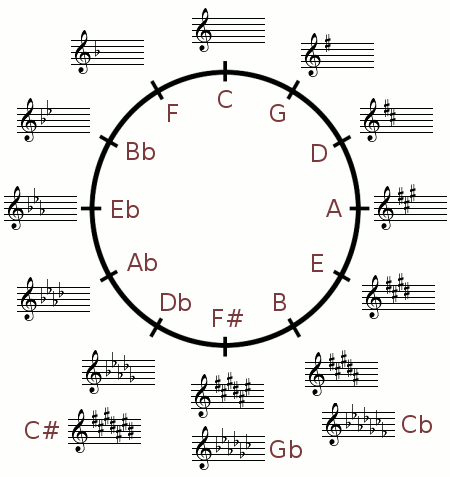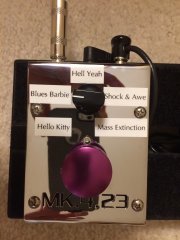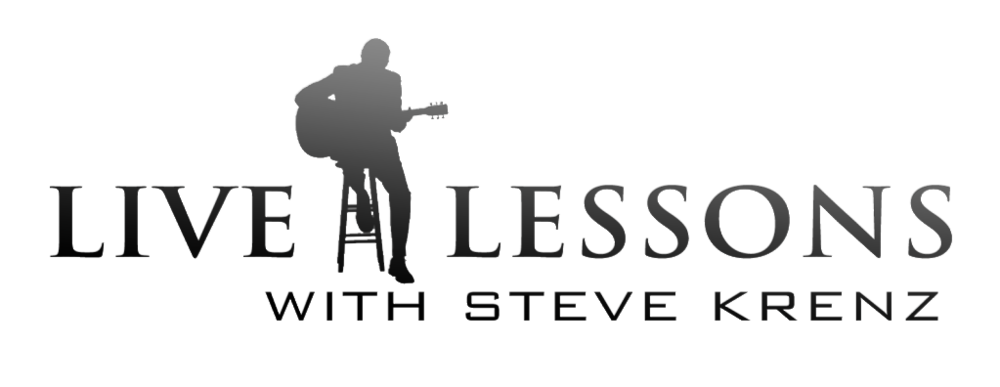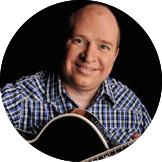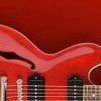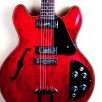-
Posts
819 -
Joined
-
Last visited
-
Days Won
211
Content Type
Profiles
Forums
Gallery
Events
Articles
Blogs
Downloads
Everything posted by DianeB
-

Live Lesson: Fiddle & Guitar Harmonizing with David Varnado
DianeB posted an event in Community Calendar
untilLive Lesson with Steve Krenz from Gruhn Guitars, 7:00 US Central Time. Watch the broadcast on our Guitar Gathering YouTube Page HERE See you there! - Steve -
Mark, I'm well along on Level 2 Advanced. I hadn't looked at the PDF in months until just now; I play along with Steve in the video on my iPad. It's nice to have the PDF to describe what's happening, but the videos really have all the info you need. As you play along, you hear what's in quarters and what's in eighths. As for speed, if I can do it on an acoustic, you can, too. It won't take a lifetime, but it's taken me a couple of years. So far. When I can't quite keep up with Steve, I pause the video and repeat that section. For variety, I do the scales out of order sometimes. This works for me. Thanks for reminding me about the PDF. It would serve me well to play through these sometimes with the sheet music in front of me.
-
But finally and ultimately, music remains an intensely personal issue. Maybe the most important commitment you can make is to the music fan that lives inside of you, to find out just what it is about music that really, really knocks you out. In that discovery, you'll find most of what you need to know to take you wherever you need to go. All of you here have roads ahead of you that will be filled with good musical days, the ones where you feel like you can play or hear anything, and bad musical days, the ones where everything you do sounds like a bad Madonna tune. But that variety, that sense of unknowing, that feeling of having to make it up yourself, that sense of adventure — that is what music is at its best, and that's a big part of why having a life as a musician is so much fun. —Pat Metheny, Berklee Commencement Address, 1997
-
untilTuesday January 23rd, 2018 Topic: Guitar Care with Greg Voros 7pm Central Time US You can watch the lesson HERE. It's the first Live Lesson of the year and I cant think of a better way to start off than with Greg Voros (head of the legendary repair department at Gruhn Guitars) to start us off. Greg will be discussion how you can take the best care of your instrument and maintain it so that it is at it's best playability. If you have any questions for Greg about guitar care, maintenance, or building, please ask them in this thread and we'll try to get to as many of them as we can. There will be music, laughs, giveaways and more. I look forward to seeing you there! Our Ustream channel is here... http://www.ustream.tv/gibson-learn-and-master-live-lessons - Steve
-
- 1
-

-
- greg voros
- guitar care
-
(and 1 more)
Tagged with:
-
Yes, Greg, I believe you are correct. G(major)6 uses the same notes (pitches, for the purists; pitch classes for the ultra purists) as an Em7 in first inversion. The name will depend on the context.
-
untilJust an entry to document our grand opening!
-
untilNo live lesson, but the next best thing: Steve will host an online chat on the new board. Bring your questions!
-

I cannot locate the PDF for Jazz Chord Course
DianeB replied to MarkDelaware's topic in Jazz Chords Fretboard Workouts
Greg, ditto for you. -
Yes, Maria, E-G-B-D is Em7 (1-b3-5-b7). E-G-B-D# is (I think) Em(maj)7. Em is G aeolian, so the flatted 7th is F for both, as I understand it. I could use some clarification with this, too.
-

I cannot locate the PDF for Jazz Chord Course
DianeB replied to MarkDelaware's topic in Jazz Chords Fretboard Workouts
Mark, I sent you a private message that should help. -
I have an Aircare humidifier in my small (10'x11') practice room -- same model as yours, Dave, I think. A month ago it seemed to be sluggish and I saw that the filter had to be changed. After I did, refilling the tank felt like pouring the water right on the floor. The highest RH I can get is about 35%, but that's a lot better than 15% !
-

NGD - Deluxe Roadhouse Strat
DianeB replied to Mike Hoodenpyle's topic in Guitar Gear, Amps, Effects, Pedals
Mike, that's going to look good on you. -
From Taylor guitars, how to recognize the symptoms. SymptomsofaDryGuitar.pdf SymptomsofaWetGuitar.pdf
-
Music Theory for Musicians and Normal People. An excellent, free 53-page PDF introduction to theory by Toby Rush. You can choose the pages the want. Blank staff paper, wide ruled and narrow ruled (PDFs). The circle of fifths (gif). My updated (Sept 2019) worksheet for learning chord construction (PDF, 2 pages). I asked my theory teacher to review my first version, and he suggested a few improvements. Advanced students might take issue with some nomenclature, but there's no pleasing everyone. Vaughn Cube errata. If you have an early edition of the Vaughn Cube for Music Theory (mine is 2008), you probably discovered some typos. I’ve collected them here (PDF, 1 page). I presume they are corrected in the latest edition. Jazz Theory, by Stuart Smith. (PDF, 89 pages) Not for rookies. You just might want to wait until Session 17! The online version is here. 8 Practice Hacks, by Noa Kageyama. (PDF, 22 pages) Straight talk to stay on track. Update (7/7/20): I deleted the old Skills House files on modes and jazz chord progressions because Steve now has updated versions in the Downloads section. Added 8 Practice Hacks. Wide Staff.pdf Narrow Staff.pdf Chord Construction Worksheet v2.pdf Errata Vaughn Cube Lesson Book.pdf 8 Practice Hacks.pdf Jazz Theory.pdf
-
When? Live Lessons are held on Tuesday evenings, approximately every other week, at 7:00 pm Central Time (UTC-5). Fifteen minutes before broadcast a countdown screen will appear and the chat will be available. When they go on the air you will see the live broadcast. It will run about an hour. When they are off the air you can view previous Live Lessons. Where? You can watch on the Guitar Gathering YouTube channel here or by clicking the header at the top of this discussion forum. Steve officially transitioned to YouTube from Ustream on February 6, 2018. Is the topic announced in advance? Steve usually will post a thread in advance letting us know the topic of the upcoming lesson, posting any necessary resources (sheet music, audio tracks, links, videos) or if it will be cancelled or rescheduled. Do they cost anything? No. Live Lessons are free. How do I ask a question or chat with other students? Anyone can view the Live Lesson. If you wish to chat with Steve, the guests, or other students, or have a chance to win the various items in giveaways, you must register for a free Google account. You can register for a Google account here. Once you have registered, you can log in and participate. To help distinguish questions directed to Steve or his guests from the online chat, type your question in ALL CAPITAL LETTERS. Which browser works best? That's difficult to say. Experiment with various browsers to find which works best for you. How do I watch past Live Lessons? You can view the most recent Live Lessons (2015 to present) at the same site as the live broadcast. How can I sign up for the giveaways? Each lesson usually has a few giveaways. These range from helpful books, CDs from guests, apparel, pedals, and (rarely) even guitars. Giveaway winners are selected at random from those logged in during the Live Lesson. You don't need to chat, but you do need to be logged in through Google/YouTube as described above. I won a giveaway! What do I do now? Congratulations! You need to e-mail Steve at Service[at]GuitarGathering.com. Include your mailing address, YouTube screen name, what you won, and size when necessary. Giveaways are usually mailed out within a few days after the broadcast. Shipping times vary depending on where you live. Some items can not be shipped outside the continental US. Items that aren't claimed will be awarded to someone else. What is YouTube SuperChat? For our purposes, it is a way viewers can donate to support Live Lessons and the discussion board. More broadly, it is a mechanism for YouTube viewers to pay for greater attention, as their comments are pinned and highlighted at the top of the live chat and more characters are permitted. It is accessed by the $ icon below the chat window. It has been reported that YouTube retains 30% of the donation. An alternative, direct way to support Guitar Gathering is via this PayPal link. How do I suggest a topic or guest? Just start a thread in this Live Lesson section of this discussion board.
-
The session-specific Roadside Assistance videos, and dozens more by Steve, are available on YouTube here. Many people are now discovering our community through Live Lessons and the summer conferences, instead of the Learn & Master DVD course. For their benefit, and because the new forum is not — at least at the outset — organized by course session, reprinted here is Steve’s outline (originally posted in 2009): Here is the basic overview of the course by topic and what I am trying to get you to learn... The Basics and Finger Exercises – Session 1 The Big Idea: To get your fingers used to playing the guitar and finding the right places on the fretboard. Also to toughen the fingers up for the road ahead. Learning to Read Music and Learning the Notes in the First Position – Sessions 2-4 The Big Idea: Being able to read a simple melody and be able to play it on guitar in the first position. Learning Basic Open Chords – Sessions 5-6 The Big Idea: Being able to form and play basic open chords in the first position using basic eighth note strumming. Learning Barre Chords, Major Scales, and Keys – Sessions 7-8 Two Big Ideas: 1) Overcoming the physical challenges and being able to play 6th and 5th string based barre chords. 2) Understand major scales and keys. Strumming and Intervals – Session 9 Two Big Ideas: 1) Gain familiarity with basic strumming patterns using ties. 2) Be able to identify intervals correctly. Fingerstyle Guitar – Session 10 The Big Idea: Overcoming the physical challenges of basic Fingerstyle technique. Pentatonic Scales – Session 11 The Big Idea: Learn how pentatonic scales function and how to play them on guitar. Advanced Chords – Session 12 The Big Idea: Expanding your chord form repertoire and using chord substitutions. Blues Scales and Triads – Session 13 Two Big Ideas: 1) Playing blues scale forms. Introducing improvising and soloing. 2) Spelling triads from memory. Various Technique Issues and Basic Chord Harmony – Sessions 14-15 Two Big Ideas: 1) Gain a basic understanding and familiarity with several guitar playing techniques. 2) Basic understanding on how chords work together. Advanced Strumming – Sessions 16 The Big Idea: Overcoming the physical challenges and gaining familiarity with 16th note based strumming. 3 Note on a String Scales and Seventh Chords – Session 17 Two Big Ideas: 1) Learning the guitar neck by playing and using 3 note on string scales. 2) Spelling seventh chords from memory. Jazz Chords and Harmony – Session 18 Two Big Ideas: 1) Expanding chord repertoire with more forms. 2) Chord alteration and harmony. Soloing Concepts – Session 19 The Big Idea: Using your ear to foster creativity when soloing. Chords, Abbreviations, and Inversions – Session 20 The Big Idea: Learning remaining important chord forms. I hope this helps clarify some things for you. Keep Learning and Growing! — Steve Krenz
-
untilThe 2018 Fall Fingerstyle Guitar Retreat will be held at the Deer Run Retreat near Thompson's Station, Tennessee. Registration limited to 20 attendees.
-
by Steve Krenz [First appeared: November 21, 2013] If you are like me, you appreciate straight talk – especially when it comes to something that is important to you, like learning guitar. There are just way too many opinions, by too many people, and too little time to wade through them all to find the real information. So, here are a few things, from where I sit, that every learning guitarist should know. 1) Decide. Are you going to do this or not? Is learning guitar and playing music an important goal in your life? If it is ever going to be more than just a “wouldn’t it be great” and a “maybe some day” kind of a hope, then you need to get busy. Stop waiting for the perfect time to get started. It will never come. Inspiration is for amateurs. Decisions, goals, and actions are what get any job done. Decide, then start. 2) Don’t wait for free time, PLAN time to learn. Everyone’s busy. Waiting to practice until you have some free time is a recipe for finding yourself a week from today not having touched your instrument. Think about your daily schedule and decide where you can fit in a few moments to practice. Set this time aside and be faithful to it. 3) Consistency is more important than quantity of time. The old saying goes “only practice on days you eat.” The human mind learns best in regular, consistent, small doses. You’ll find you learn and retain more in 15 minutes a day for 5 days than a 3 hour “binge” practice session on the weekend. Don’t believe me? Try it and see. 4) When practicing, work and reach. Don’t fool yourself into thinking, “just because I have my guitar in my hands, I’m getting better.” Progressing in your learning comes from “reaching” – from doing things that you can’t do. It comes from struggling with a new task, fumbling around, making mistakes, eventually getting better at it, until slowly more successful attempts are made. If you’re not “reaching” and “struggling”, then you’re not progressing. 5) Never waste a good mistake. Learn from it. Don’t make a mistake and think “well, I just messed up.” If you make the same mistake more than once then stop and think about what happened. What specific musical task did you stumble over? Isolate it, and analyze it. Was it the change between two specific chords? Or, perhaps, you’re consistently overreaching to get a particular note? You’ll find that your mistakes are hardly ever random. They are very specific. Find what you stumble over, isolate it, practice it slowly until you can play it consistently correct, then put it back into context within the song. Be a student of your mistakes so that you can learn from them. 6) Record your progress - seeing the flower bloom. When you finally get that new exercise down make a short video of yourself playing it. Try to make one video a week. After three months, you’ll be able to clearly see the progress you are making. Recording yourself helps you measure your progress but it also helps you learn how to switch from “practice mode” to “performance mode” which is a vital skill. 7) Bring someone else along in your learning journey. It’s no fun learning alone. Involve someone else in your learning journey. Play your new song for your spouse, or friend. It’s not about them being “impressed” with your playing. It’s about having someone to help you be faithful to your commitment to learn. 8) Relax. It’s just guitar. Learning guitar shouldn’t be stressful. It’s a long road toward a very worthwhile and life-enriching end. Relax and enjoy the journey. You’ll learn a lot better. Keep up the great work! – Steve

